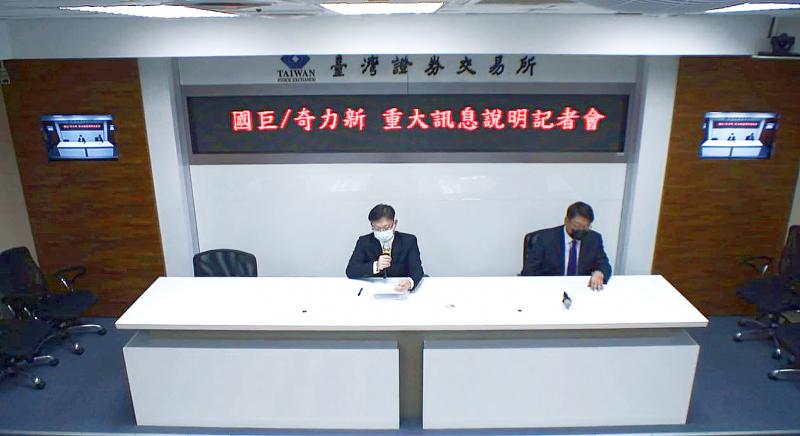Yageo Corp’s (國巨) board of directors has approved a plan to fully acquire Chilisin Electronics Corp (奇力新) in a bid to accelerate the firm’s expansion into high-margin passive component markets through improved product integration, Yageo said yesterday.
The takeover would allow Yageo to provide a one-stop shopping service, and aligns with supply chain optimization efforts made by clients in the past few years, Yageo chairman Pierre Chen (陳泰銘) told a virtual media briefing yesterday.
Chen is also chairman of Chilisin.

Photo: Chang Hui-wen, Taipei Times
The merger would also help boost Yageo’s revenue and earnings per share, he said.
Chilisin would make up 15 percent of Yageo’s total revenue after the transaction is completed, Yageo said, adding that it aims to finalize the deal on Dec. 30.
Hsinchu-based Chilisin last year posted revenue of NT$17.44 billion (US$625.8 million), while Yageo posted NT$67.66 billion.
Yageo, the world’s third-largest supplier of multilayer ceramic capacitors, owns about 11.5 percent of Chilisin shares.
Chilisin is the world’s third-largest supplier of inductor components.
Over the past three years, Yageo has optimized its product portfolio through acquisitions of Kemet Corp and Pulse Electronics Corp, with high-margin premium products accounting for 75 percent of its revenue, Chen said, adding that these products accounted for 30 percent of revenue in 2017.
“For the first time, Yageo has the chance to have a bite of the industry’s cream of the crop, thanks to the acquisitions of Kemet and Pulse,” Chen said.
Chilisin could achieve a similar improvement by leveraging Yageo’s strength in passive component deployments and extensive sales channels worldwide, Chen said, adding that the firm could broaden its product portfolio from chip resistors and capacitors to inductors.
That would also help safeguard its stability in product supply to clients and prices, he said.
Yageo’s premium products with gross margins of more than 35 percent are used in vehicles, and industrial and aeronautic devices, the firm said.
About 18 percent of revenue came from passive components for vehicles, Yageo said.
Chilisin’s gross margins have come under constraints due to the firm’s significant exposures to the Chinese market with its cut-throat price competition and limited sales channel, Yageo said.
Chilisin shipped more than 80 percent of its products to China, it added.
After joining Yageo, Chilisin should see revenue from premium products grow 10 to 15 percent per year, Chen said.
Chilisin focuses on making inductor components for consumer electronics, mobile devices and communications applications.
Both companies’ boards agreed to the acquisition through a share swap.
Each Chilisin share would be exchanged for 0.2002 shares of Yageo, the firms said in a joint statement.
The offering represented a premium of 10 percent based on Chilisin’s closing price of NT$101 on Tuesday.
Chilisin would become a subsidiary of Yageo and be delisted from the local stock market.

Six Taiwanese companies, including contract chipmaker Taiwan Semiconductor Manufacturing Co. (TSMC), made the 2025 Fortune Global 500 list of the world’s largest firms by revenue. In a report published by New York-based Fortune magazine on Tuesday, Hon Hai Precision Industry Co. (better known as Foxconn) ranked highest among Taiwanese firms, placing 28th with revenue of US$213.69 billion. Up 60 spots from last year, TSMC rose 60 places to reach No. 126 with US$90.16 billion in revenue, followed by Quanta Computer Inc. at 348th, Pegatron Corp. at 461st, CPC Corp., Taiwan at 494th and Wistron Corp. at 496th. According to Fortune, the world’s

NEW PRODUCTS: MediaTek plans to roll out new products this quarter, including a flagship mobile phone chip and a GB10 chip that it is codeveloping with Nvidia Corp MediaTek Inc (聯發科) yesterday projected that revenue this quarter would dip by 7 to 13 percent to between NT$130.1 billion and NT$140 billion (US$4.38 billion and US$4.71 billion), compared with NT$150.37 billion last quarter, which it attributed to subdued front-loading demand and unfavorable foreign exchange rates. The Hsinchu-based chip designer said that the forecast factored in the negative effects of an estimated 6 percent appreciation of the New Taiwan dollar against the greenback. “As some demand has been pulled into the first half of the year and resulted in a different quarterly pattern, we expect the third quarter revenue to decline sequentially,”

WEAKER ACTIVITY: The sharpest deterioration was seen in the electronics and optical components sector, with the production index falling 13.2 points to 44.5 Taiwan’s manufacturing sector last month contracted for a second consecutive month, with the purchasing managers’ index (PMI) slipping to 48, reflecting ongoing caution over trade uncertainties, the Chung-Hua Institution for Economic Research (CIER, 中華經濟研究院) said yesterday. The decline reflects growing caution among companies amid uncertainty surrounding US tariffs, semiconductor duties and automotive import levies, and it is also likely linked to fading front-loading activity, CIER president Lien Hsien-ming (連賢明) said. “Some clients have started shifting orders to Southeast Asian countries where tariff regimes are already clear,” Lien told a news conference. Firms across the supply chain are also lowering stock levels to mitigate

DIVERSIFYING: Taiwanese investors are reassessing their preference for US dollar assets and moving toward Europe amid a global shift away from the greenback Taiwanese investors are reassessing their long-held preference for US-dollar assets, shifting their bets to Europe in the latest move by global investors away from the greenback. Taiwanese funds holding European assets have seen an influx of investments recently, pushing their combined value to NT$13.7 billion (US$461 million) as of the end of last month, the highest since 2019, according to data compiled by Bloomberg. Over the first half of this year, Taiwanese investors have also poured NT$14.1 billion into Europe-focused funds based overseas, bringing total assets up to NT$134.8 billion, according to data from the Securities Investment Trust and Consulting Association (SITCA),